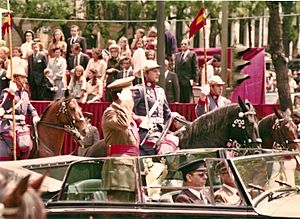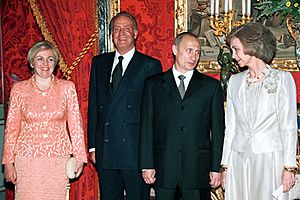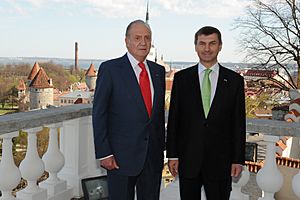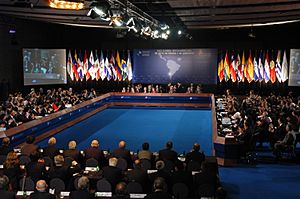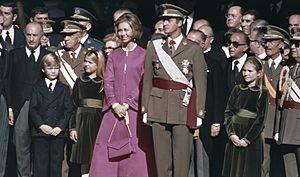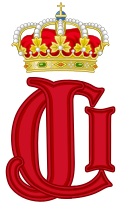Juan Carlos I facts for kids
Quick facts for kids Juan Carlos I |
|||||
|---|---|---|---|---|---|
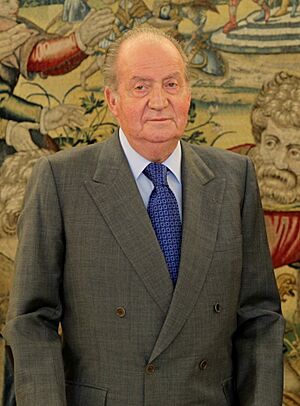
Juan Carlos I in 2013
|
|||||
| King of Spain (more...) | |||||
| Reign | 22 November 1975 – 19 June 2014 | ||||
| Enthronement | 27 November 1975 | ||||
| Predecessor | Francisco Franco (as caudillo) Alfonso XIII (as king) |
||||
| Successor | Felipe VI | ||||
| Born | 5 January 1938 Rome, Italy |
||||
| Spouse | |||||
| Issue | |||||
|
|||||
| House | Bourbon | ||||
| Father | Infante Juan, Count of Barcelona | ||||
| Mother | Princess María de las Mercedes of Bourbon-Two Sicilies | ||||
| Signature | |||||
| Education | Complutense University of Madrid | ||||
Juan Carlos I (born 5 January 1938) was the King of Spain from 1975 until he stepped down in 2014. After his abdication, he is often called the rey emérito, which means 'king emeritus'.
Juan Carlos is the son of Infante Juan, Count of Barcelona, and the grandson of Alfonso XIII. Alfonso XIII was the last king of Spain before the country became a republic in 1931. Juan Carlos was born in Rome, Italy, because his family was living in exile.
After the Spanish Civil War ended in 1939, Francisco Franco became the leader of Spain. In 1947, Spain was declared a monarchy again, and Franco was given the power to choose his successor. Franco chose Juan Carlos to be the next head of state in 1969, even though Juan Carlos's father was next in line.
Juan Carlos moved to Spain in 1947 for his education. He completed his military training and studied at the Complutense University of Madrid. In 1962, he married Princess Sophia of Greece and Denmark. They have three children: Elena, Infanta Cristina, and Felipe. Juan Carlos became king in November 1975 after Franco passed away.
Instead of continuing Franco's strict rule, Juan Carlos helped Spain become a democracy. This led to the creation of the Spanish Constitution of 1978, which made Spain a constitutional monarchy. In 1981, he played a key role in stopping a military coup that tried to bring back the old government. Juan Carlos was widely admired for his part in Spain's move to democracy. However, later on, some questions about his family and finances arose. In June 2014, he stepped down as king, and his son, Felipe, became the new king.
Contents
Early Life and Education
Juan Carlos Alfonso Víctor María was born in Rome, Italy. His parents were Infante Juan, Count of Barcelona, and Princess María de las Mercedes of Bourbon-Two Sicilies. His family was in exile after Spain became a republic in 1931. He was baptized by Cardinal Eugenio Pacelli, who later became Pope Pius XII.
Juan Carlos's early life was shaped by the political situation in Spain. He moved to Spain in 1948 to study. He finished his secondary education in 1954 in Madrid. From 1955 to 1957, he trained as an officer at the Military Academy of Zaragoza.
Juan Carlos has two sisters: Infanta Pilar, Duchess of Badajoz (1936–2020) and Infanta Margarita, Duchess of Soria (born 1939). He also had a younger brother, Alfonso (1941–1956). Franco chose to call him "Juan Carlos" from his baptismal name. In his family, he was known as "Juan" or "Juanito."
In 1954, Juan Carlos met Sofia, his future wife, for the first time during a royal cruise.
Brother's Passing
On 29 March 1956, Juan Carlos's younger brother, Alfonso, passed away in a gun accident at their family home in Portugal. The official statement said that Alfonso was cleaning a revolver with his brother when a shot was fired.
Juan Carlos was 18 and Alfonso was 14. They were alone in the room. It is not fully clear how the accident happened. Some accounts suggest Juan Carlos fired the pistol, not knowing it was loaded.
Royal Education
After military training, Juan Carlos spent a year in the naval school and another in the Air Force school. From 1960 to 1961, he studied law, international political economy, and public finance at the Complutense University of Madrid. After his studies, he began to take part in official royal duties.
Becoming Prince of Spain
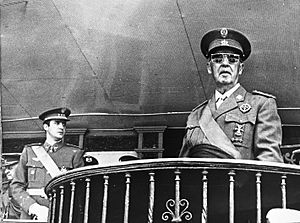
The government of Francisco Franco came to power after the Spanish Civil War. Franco's rule was very strict. As Franco grew older, there were more protests for change. The heir to the throne was Juan Carlos's father, Infante Juan, but Franco did not trust him because he seemed too liberal.
Franco decided to choose Juan Carlos as his successor, hoping the young prince would continue his way of governing. In 1969, Juan Carlos was officially named heir-apparent and given the title of Prince of Spain. He had to promise loyalty to Franco's government. The Spanish parliament approved this choice on 22 July 1969.
Juan Carlos often met with Franco and appeared with him at official events. Publicly, he supported Franco's government. However, in secret, Juan Carlos began meeting with leaders who wanted to bring democratic changes to Spain. He also spoke secretly with his father. Franco did not seem to know about these secret meetings.
When Franco was temporarily unable to govern in 1974 and 1975, Juan Carlos acted as head of state. On 30 October 1975, Franco gave Juan Carlos full control.
Reign as King
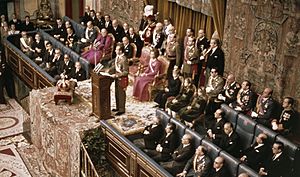
Franco passed away on 20 November 1975. Two days later, on 22 November, the Spanish parliament declared Juan Carlos King of Spain. He chose the name Juan Carlos I. On 27 November, a special ceremony was held to mark the start of his reign.
Transition to Democracy
Juan Carlos quickly began to introduce changes to move Spain towards democracy. This surprised many who expected him to continue Franco's strict rule.
In July 1976, Juan Carlos removed Prime Minister Carlos Arias Navarro, who wanted to continue Franco's policies. He then appointed Adolfo Suárez as prime minister.
On 14 May 1977, Juan Carlos's father formally gave up his claim to the throne. This made Juan Carlos the official king in the eyes of traditional monarchists. On 20 May 1977, Felipe González, the leader of the recently legalized Spanish Socialist Workers' Party, visited Juan Carlos. This meeting showed that even left-wing political groups, who had historically supported a republic, were now supporting the monarchy. Juan Carlos had also pushed for the legalization of the Communist Party of Spain, despite strong opposition.
On 15 June 1977, Spain held its first democratic elections after Franco's rule. Adolfo Suárez won and became the first democratically elected leader.
In 1978, a new constitution was created. It recognized Juan Carlos as the rightful king through his family line, not just as Franco's chosen successor. The people approved this constitution in a vote, and the King signed it into law.
Stopping a Coup Attempt in 1981
On 23 February 1981, there was an attempted military coup. Members of the Guardia Civil took over the parliament building. During this event, King Juan Carlos appeared on television in his military uniform. He called for everyone to support the democratic government. This broadcast is believed to have been very important in stopping the coup. The coup leaders had claimed they were acting for the King, but his message clearly showed he was against them.
After the coup failed, Communist leader Santiago Carrillo, who had once called Juan Carlos "Juan Carlos the Brief," said, "Today, we are all monarchists." Public support for the monarchy grew a lot after the King's actions during the coup.
Later Role in Politics
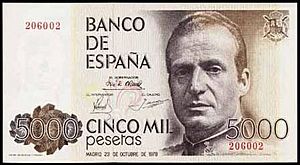
After the Socialist Party won in 1982, King Juan Carlos became less actively involved in politics. He took on a more symbolic role, representing the country and ensuring the Constitution was followed. He was seen as an important symbol of Spain's unity.
The King gave an annual speech to the nation on Christmas Eve. He was also the commander-in-chief of the Spanish armed forces.
In 2005, when asked about a law to legalize same-sex marriage, he said, "I am the King of Spain, not of Belgium," referring to a king who refused to sign a law. Juan Carlos later gave his approval to the law.
In November 2005, a poll showed that 77.5% of Spaniards thought Juan Carlos was "good or very good."
2007 Ibero-American Summit Incident
In November 2007, at a meeting in Chile, Juan Carlos famously interrupted Venezuelan President Hugo Chávez by saying, "¿Por qué no te callas?" ("Why don't you shut up?"). Chávez had been interrupting the Spanish Prime Minister. This was a rare public display of anger from the King.
Botswana Hunting Trip
In April 2012, Juan Carlos faced criticism for an elephant-hunting trip in Botswana. The public learned about it after he was injured and needed a special plane to return home. This happened during a time of high unemployment in Spain. Many people felt it showed a lack of sensitivity. The World Wide Fund for Nature (WWF) removed him from its honorary presidency. He later apologized for the trip.
Abdication
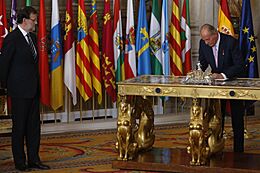
In 2013, there was public discussion about the King's future, especially after the hunting trip and some financial questions involving his daughter and her husband.
On 2 June 2014, Prime Minister Mariano Rajoy announced that the King intended to step down. Juan Carlos then gave a televised speech, saying he would abdicate in favor of his son, the Prince of Asturias. Royal officials said it was a personal decision he had considered since his 76th birthday. He reportedly said, "We do not want my son to wither waiting like Prince Charles."
The Spanish parliament approved the law for his abdication. On 18 June, he signed the law. His abdication took effect, and his son, Felipe, became King Felipe VI on 19 June 2014. Juan Carlos was the fourth European monarch to abdicate in just over a year.
After his abdication, the law was changed to give him some legal protection, similar to high-ranking officials, but he could still be held accountable by the supreme court.
Public Reaction to Abdication

The Spanish press generally reacted positively to the news, calling it an important moment for Spain's democracy. Some people celebrated and protested, calling for the end of the monarchy.
Regional leaders had mixed reactions. The Catalan leader said the abdication would not stop the independence process for Catalonia. The Basque President noted the King's reign had "light yet also darkness." Other leaders praised him as "the King of Democracy."
International leaders also commented. British Prime Minister David Cameron praised Juan Carlos for helping Spain's transition to democracy. The President of the European Commission called him a "believer in Europeanism and modernity."
A poll showed that 65% of Spaniards viewed the King's reign as good or very good. More than half supported the monarchy, and most believed his son, Felipe VI, would be a good king.
Retirement and Recent Events
After stepping down, Juan Carlos continued to represent the Crown at various events until June 2019. He attended presidential inaugurations in Latin America, cultural events, funerals, and award ceremonies. He was also present at celebrations for the 40th anniversary of the Spanish Constitution of 1978.
On 27 May 2019, Juan Carlos announced his decision to retire from public life, effective 2 June 2019.
Financial Questions
In recent years, questions have arisen about Juan Carlos's finances. In 2020, Swiss authorities began investigating a large gift he made to a former associate. This gift was linked to alleged payments from Saudi Arabia related to the construction of a high-speed railway.
In March 2020, it was reported that his son, King Felipe VI, was named as a beneficiary of a foundation that received a large donation from the King of Saudi Arabia. King Felipe VI then announced he would give up any inheritance from his father and that Juan Carlos would no longer receive his public payment from the state budget.
Spanish prosecutors also opened investigations into Juan Carlos's use of credit cards between 2016 and 2018, which were paid for by an overseas account. In December 2020, Juan Carlos reportedly paid a sum to Spain's tax agency related to these "opaque credit cards."
In December 2021, Swiss prosecutors closed their cases, stating they could not prove any illegal activity. In March 2022, Spanish prosecutors also closed all cases against him.
Relocation Abroad
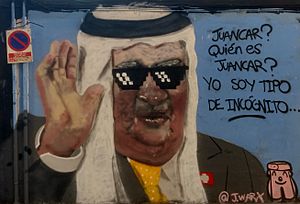
On 3 August 2020, the Royal Household announced that Juan Carlos wished to move out of Spain due to increased media attention on his business dealings. He had already left the country by the time the letter was made public. On 17 August, the Royal Household confirmed that Juan Carlos was in the United Arab Emirates.
Since then, he has visited Spain regularly, especially the town of Sanxenxo for sailing. He was also present at a private family celebration for his granddaughter Leonor's 18th birthday.
Family and Hobbies
Juan Carlos married Princess Sophia of Greece and Denmark on 14 May 1962. They had two ceremonies, one Roman Catholic and one Greek Orthodox. She converted to Roman Catholicism. They have three children:
- Infanta Elena, Duchess of Lugo (born 20 December 1963)
- Infanta Cristina (born 13 June 1965)
- King Felipe VI of Spain (born 30 January 1968)
Juan Carlos is a keen sailor. He competed in the Dragon class event at the 1972 Olympic Games, finishing 15th. During summer holidays, the family often spent time at Marivent Palace in Palma de Mallorca and on their yacht Fortuna, where they took part in sailing competitions. In winter, they often went skiing. Today, his hobbies include classic sailing boats.
Health
In May 2010, a small, harmless growth was removed from King Juan Carlos's right lung.
In April 2012, the King had surgery for a hip fracture after a fall during a trip to Botswana. He also had another hip operation in September 2013. In April 2018, he had surgery on his right knee. On 24 August 2019, he had heart surgery.
Titles and Symbols
In 1969, Juan Carlos was named 'Prince of Spain'. When Franco passed away in 1975, Juan Carlos became King of Spain. The current Spanish constitution simply calls the monarch "King of Spain." Since his abdication in 2014, King Juan Carlos has kept the title of king and the style of "majesty" as a courtesy. He also keeps his military rank in reserve.
Royal Symbols
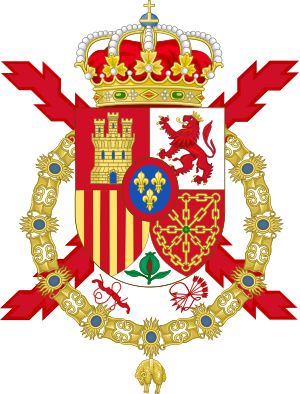 |
The coat of arms used as Prince of Spain which was virtually identical to the one later adopted when he became King, differed only that it featured the crown of heir to the throne, decorated with only four half-arches." |
Images for kids
See also
 In Spanish: Juan Carlos I de España para niños
In Spanish: Juan Carlos I de España para niños


